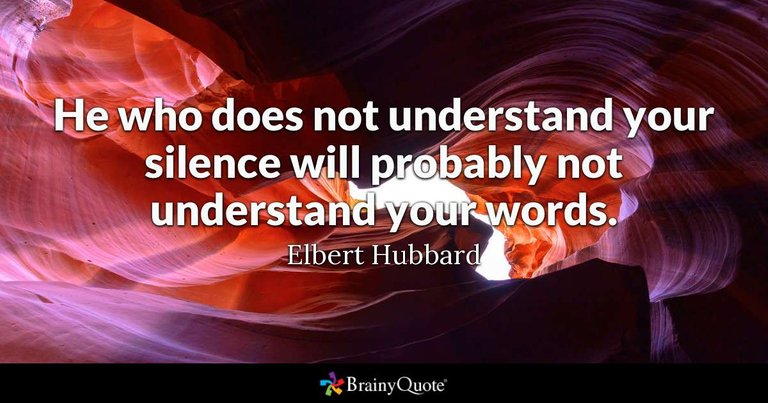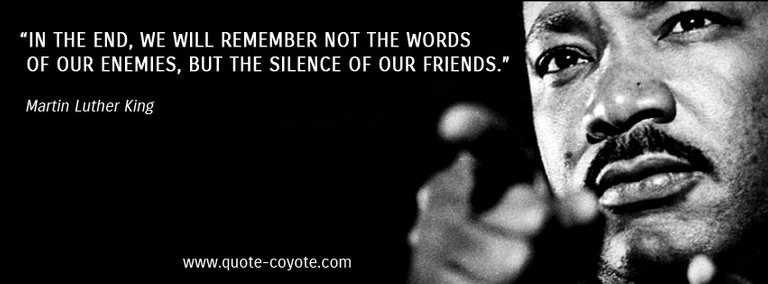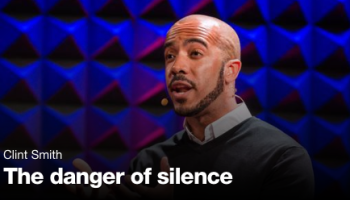
I walked into class today and saw my professor standing in front of a powerpoint slide that said "today I am exercising complete silence for class. You are encouraged to either speak or also be silent, please know that even though I am silent I am wholly listening and engaged." I was immediately frustrated and thought about just walking out. After all, I pay so much money for this education and deserve more than her silence. But, it was my communications class, so I figured she had a point about silence and communication that she wanted to make. She did, and I'm really glad I stayed to hear it (or...not hear it...experience it?)
I’m taking this Civil Discourse philosophy course where we learn how to engage in conversation with people of differing opinions. It has been incredibly fruitful to practice different skills to help understand different points of view and I think viewing today's silence within this framework was helpful today. One exercise we practice is the line exercise where we place two opposing and extreme opinions on either end of “the line” and then discuss the boundaries and divisions within those opinions in the middle of the line. In other words, we base our discussions completely within the space of liminality--that space where ideas are undefined and ambiguous, yet still carry meaning. So, for example, in trying to define “silence”, we would decide on the two opposing meanings of silence in terms of communication: positive and negative.

Silence can be a way of losing your voice, being unable to “speak your truth”, refusing to help a friend, or just complete uncertainty all around. On the other hand, silence can also mean truly listening, finding truth within oneself and one’s environment, being at peace, or being purely focused on the moment. As we discovered in class, silence can even modulate time, making it seem both incredibly short and painstakingly long.
I wrote in my notes that “silence is capable of finding meaning as well as hiding it”.
In terms of communication, silence is both meaningless and meaningful. And even when it’s meaningless there is still some silent message being conveyed there. As explained in the Ted talk, our silence can represent a deep-rooted truth that we are unable to say. Yet, silence can sometimes mean we aren’t engaged and aren’t present. When I walked into class today my immediate reaction was that class would be pointless if my professor wasn't talking.
These two opposing experiences of silence were apparent throughout class for me.
Within the span of an hour—and even within seconds—I wrestled with those two extreme meanings of silence. I struggled with its meaning until I was thrown into the space of liminality that saw these conflicting meanings as one.
This happened primarily through the following quotes:

“He who does not understand your silence cannot understand your words”
I realized that words themselves carry their own silent meaning behind them and, if someone cannot understand that silence, they cannot understand those words. For example, I think we talked about at the beginning of the semester that behind everyone’s words exists a request saying “love and accept me”. That is something that is never said, but always intended within conversations. Our appreciation and recognition for that silent request becomes essential to listening and understanding the words being spoken.

“In the end, we remember not the words of our enemies, but the silence of our friends.”
Painful words from our enemies are a legitimate aspect to that relationship, but silence from our friends can actually contradict the definition of friendship, which can be a pain that sticks with us for a lifetime. I think that this emphasizes the importance of managing and interpreting silence and how failure to maintain it can have long-lasting effects. This idea also emphasizes that silence is not always an acceptable alternative to words but rather a foundation for the meaning behind them (or lack of them).

https://www.ted.com/talks/clint_smith_the_danger_of_silence
But, these two realizations about silence still divide its meaning. Here, silence is both used positively and negatively to affirm and disavow. After viewing the Ted Talk I finally understood how they could coexist.
He explained that silence can represent our personal truth that we hide out of fear, and it is crucial to our identity to speak that truth. Yet, his presentation was challenging to me because if everyone is speaking their truth, then we can’t hear each other. It’s so paradoxical that in order to truly hear other’s truths...we may have to silence our own for a little bit. After hearing other’s truths we then reflect on our own and maybe share it. This requires a delicate balance between silence and speech, action and contemplation, and ultimately living in the liminal experience of silence that embraces the infinite possibilities it creates for us.

That was a great read, I just remembered the song from Alan Parsons project..."We're two of a kind, silence and I, We'll find a way to work it out"
Following :)
Love that connection! Classic. Thanks for the follow :)